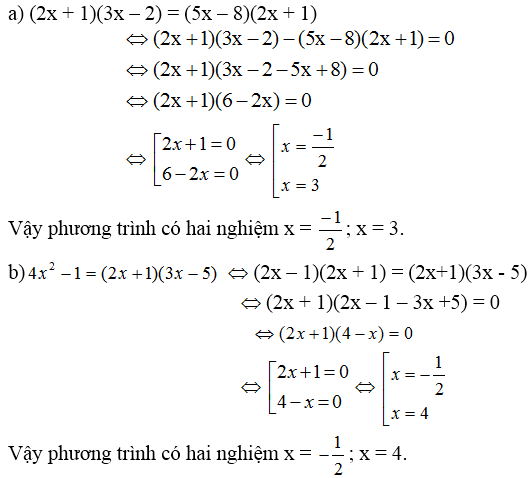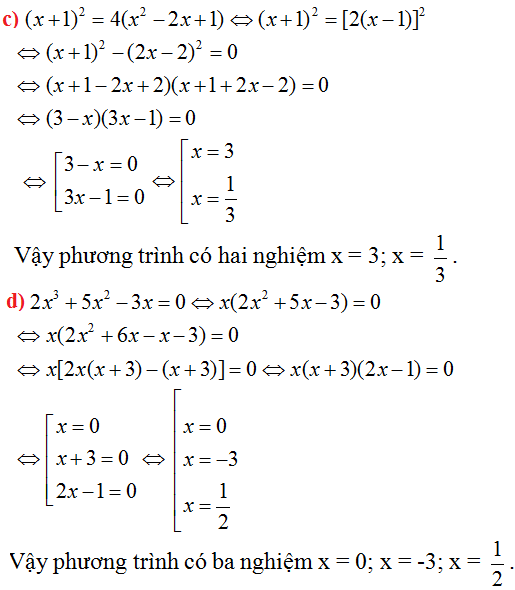Hãy nhập câu hỏi của bạn vào đây, nếu là tài khoản VIP, bạn sẽ được ưu tiên trả lời.

a)(2x+1)(3x-2)=(5x-8)(2x+1)
⇔(2x+1)(3x-2)-(5x-8)(2x+1)=0
⇔(2x+1)(3x-2-5x+8)=0
⇔(2x+1)(-2x+6)=0
⇔2x+1=0 hoặc -2x+6=0
1.2x+1=0⇔2x=-1⇔x=-1/2
2.-2x+6=0⇔-2x=-6⇔x=3
phương trình có 2 nghiệm x=-1/2 và x=3

a) (x-1)(5x+3)=(3x-8)(x-1)
= (x-1)(5x+3)-(3x-8)(x-1)=0
=(x-1)[(5x+3)-(3x-8)]=0
=(x-1)(5x+3-3x+8)=0
=(x-1)(2x+11)=0
\(\Leftrightarrow\) x-1=0 hoặc 2x+11=0
\(\Leftrightarrow\) x=1 hoặc x=\(\dfrac{-11}{2}\)
Vậy S={1;\(\dfrac{-11}{2}\)}
b) 3x(25x+15)-35(5x+3)=0
=3x.5(5x+3)-35(5x+3)=0
=15x(5x+3)-35(5x+3)=0
=(5x+3)(15x-35)=0
\(\Leftrightarrow\) 5x+3=0 hoặc 15x-35=0
\(\Leftrightarrow\) x=\(\dfrac{-3}{5}\) hoặc x=\(\dfrac{7}{3}\)
Vậy S={\(\dfrac{-3}{5};\dfrac{7}{3}\)}
c) (2-3x)(x+11)=(3x-2)(2-5x)
=(2-3x)(x+11)-(3x-2)(2-5x)=0
=(3x-2)[(x+11)-(2-5x)]=0
=(3x-2)(x+11-2+5x)=0
=(3x-2)(6x+9)=0
\(\Leftrightarrow\) 3x-2=0 hoặc 6x+9=0
\(\Leftrightarrow\) x=\(\dfrac{2}{3}\) hoặc x=\(\dfrac{-3}{2}\)
Vậy S={\(\dfrac{2}{3};\dfrac{-3}{2}\)}
d) (2x2+1)(4x-3)=(2x2+1)(x-12)
=(2x2+1)(4x-3)-(2x2+1)(x-12)=0
=(2x2+1)[(4x-3)-(x-12)=0
=(2x2+1)(4x-3-x+12)=0
=(2x2+1)(3x+9)=0
\(\Leftrightarrow\)2x2+1=0 hoặc 3x+9=0
\(\Leftrightarrow\)x=\(\dfrac{1}{2}\)hoặc x=\(\dfrac{-1}{2}\) hoặc x=-3
Vậy S={\(\dfrac{1}{2};\dfrac{-1}{2};-3\)}
e) (2x-1)2+(2-x)(2x-1)=0
=(2x-1)[(2x-1)+(2-x)=0
=(2x-1)(2x-1+2-x)=0
=(2x-1)(x+1)=0
\(\Leftrightarrow\) 2x-1=0 hoặc x+1=0
\(\Leftrightarrow\) x=\(\dfrac{-1}{2}\) hoặc x=-1
Vậy S={\(\dfrac{-1}{2}\);-1}
f)(x+2)(3-4x)=x2+4x+4
=(x+2)(3-4x)=(x+2)2
=(x+2)(3-4x)-(x+2)2=0
=(x+2)[(3-4x)-(x+2)]=0
=(x+2)(3-4x-x-2)=0
=(x+2)(-5x+1)=0
\(\Leftrightarrow\) x+2=0 hoặc -5x+1=0
\(\Leftrightarrow\) x=-2 hoặc x=\(\dfrac{1}{5}\)
Vậy S={-2;\(\dfrac{1}{5}\)}

a) <=> \(6x^2-5x+3-2x+3x\left(3-2x\right)=0\)
<=> \(6x^2-5x+3-2x+9x-6x^2=0\)
<=> \(2x+3=0\)
<=> \(x=\frac{-3}{2}\)
b) <=> \(10\left(x-4\right)-2\left(3+2x\right)=20x+4\left(1-x\right)\)
<=> \(10x-40-6-4x=20x+4-4x\)
<=> \(6x-46-16x-4=0\)
<=> \(-10x-50=0\)
<=> \(-10\left(x+5\right)=0\)
<=> \(x+5=0\)
<=> \(x=-5\)
c) <=> \(8x+3\left(3x-5\right)=18\left(2x-1\right)-14\)
<=> \(8x+9x-15=36x-18-14\)
<=> \(8x+9x-36x=+15-18-14\)
<=> \(-19x=-14\)
<=> \(x=\frac{14}{19}\)
d) <=>\(2\left(6x+5\right)-10x-3=8x+2\left(2x+1\right)\)
<=> \(12x+10-10x-3=8x+4x+2\)
<=> \(2x-7=12x+2\)
<=> \(2x-12x=7+2\)
<=> \(-10x=9\)
<=> \(x=\frac{-9}{10}\)
e) <=> \(x^2-16-6x+4=\left(x-4\right)^2\)
<=> \(x^2-6x-12-\left(x-4^2\right)=0\)
<=> \(x^2-6x-12-\left(x^2-8x+16\right)=0\)
<=> \(x^2-6x-12-x^2+8x-16=0\)
<=> \(2x-28=0\)
<=> \(2\left(x-14\right)=0\)
<=> x-14=0
<=> x=14

(1) cho A = 4,25 x(b + 41,53 ) - 125. tim b de A co gia tri =300 . (2)

a) đặt \(\left(x^2+x\right)\)là \(y\)
ta có: \(3y^2-7y+4\)\(=0\)
<=>\(\left(3y-4\right)\left(y-1\right)=0\)
còn lại bạn tự xử nhé

\(a,2x\left(x-3\right)+5\left(x-3\right)=0\)
\(\Leftrightarrow\left(2x+5\right)\left(x-3\right)=0\)
\(\Leftrightarrow\orbr{\begin{cases}2x+5=0\\x-3=0\end{cases}}\Leftrightarrow\orbr{\begin{cases}2x=-5\\x=3\end{cases}}\Leftrightarrow\orbr{\begin{cases}x=-\frac{5}{2}\\x=3\end{cases}}\)
Vậy .........
\(b,\left(x^2-4\right)+\left(x-2\right)\left(3-2x=0\right)\)
\(\Leftrightarrow x^2-4-2x^2+7x-6=0\)
\(\Leftrightarrow-x^2+7x-10=0\)
\(\Leftrightarrow-\left(x-5\right)\left(x-2\right)=0\)
\(\Leftrightarrow\orbr{\begin{cases}x=5\\x=2\end{cases}}\)
Vậy ..................
\(c,x^3-3x^2+3x-1=0\)
\(\Leftrightarrow\left(x-1\right)^3=0\)
\(\Leftrightarrow x=1\)
\(d,x\left(2x-7\right)-4x+14=0\)
\(\Leftrightarrow2x^2-7x-4x+14=0\)
\(\Leftrightarrow2x^2-11x+14=0\)
\(\Leftrightarrow\left(2x-7\right)\left(x-2\right)=0\)
\(\Leftrightarrow\orbr{\begin{cases}x=\frac{7}{2}\\x=2\end{cases}}\)
Vậy ............
\(e,\left(2x-5\right)^2-\left(x+2\right)^2=0\)
\(\Leftrightarrow4x^2-20x+25-x^2-4x-4=0\)
\(\Leftrightarrow3x^2-24x+21=0\)
\(\Leftrightarrow3\left(x-7\right)\left(x-1\right)=0\)
\(\Leftrightarrow\orbr{\begin{cases}x-7=0\\x-1=0\end{cases}}\Leftrightarrow\orbr{\begin{cases}x=7\\x=1\end{cases}}\)
Vậy .....................
\(f,x^2-x-\left(3x-3\right)=0\)
\(\Leftrightarrow x^2-x-3x+3=0\)
\(\Leftrightarrow x^2-4x+3=0\)
\(\Leftrightarrow\left(x-3\right)\left(x-1\right)=0\)
\(\Leftrightarrow\orbr{\begin{cases}x-3=0\\x-1=0\end{cases}}\Leftrightarrow\orbr{\begin{cases}x=3\\x=1\end{cases}}\)
Vậy ..............

a) 0,75x(x + 5) = (x + 5)(3 - 1,25x)
<=> 0,75x(x + 5) - (x + 5)(3 - 1,25x) = (x + 5)(3 - 1,25x) - (x + 5)(3 - 1,25x)
<=> 0,75x(x + 5) - (x + 5)(3 - 1,25x) = 0
<=> (x + 5)(0,75 + 1,25x - 3) = 0
<=> (x + 5)(2x - 3) = 0
<=> x + 5 = 0 hoặc 2x - 3 = 0
<=> x = -5 hoặc x = 3/2
b) 4/5 - 3 = 1/5x(4x - 15)
<=> -11/5 = x(4x - 15)/5
<=> -11 = x(4x - 15)
<=> -11 = 4x2 - 15x
<=> 11 + 4x2 - 15x = 0
<=> 4x2 - 4x - 11x + 11 = 0
<=> 4x(x - 1) - 11(x - 1) = 0
<=> (4x - 11)(x - 1) = 0
<=> 4x - 11 = 0 hoặc x - 1 = 0
<=> x = 11/4 hoặc x = 1
c) \(\left(x-3\right)-\frac{\left(x-3\right)\left(2x-5\right)}{6}=\frac{\left(x-3\right)\left(3-x\right)}{4}\)
<=> 12x - 36 - 2(x - 3)(2x - 5) = 3(x - 3)(3 - x)
<=> 12x - 36 - 4x2 + 10x + 12x - 30 = 9x - 3x2 - 27 + 9x
<=> 34x - 66 - 4x2 = 18x - 3x2 - 27
<=> 34x - 66 - 4x2 - 18x + 3x2 + 27 = 0
<=> 16x - 39x - x2 = 0
<=> x2 - 16x + 39x = 0
<=> (x - 3)(x - 13) = 0
<=> x - 3 = 0 hoặc x - 13 = 0
<=> x = 3 hoặc x = 13
d) \(\frac{\left(3x+1\right)\left(3x-2\right)}{3}+5\left(3x+1\right)=\frac{2\left(2x+1\right)\left(3x+1\right)}{3}+2x\left(3x+1\right)\)
<=> (3x + 1)(3x - 2) + 15(3x + 1) = 2(2x + 1)(3x + 1) + 6x(3x + 1)
<=> 9x2 - 6x + 3x - 2 + 45x + 15 = 12x3 + 4x + 6x + 2 + 18x2 + 6x
<=> 9x2 + 42x + 13 = 30x2 + 16x + 2
<=> 9x2 + 42x + 13 - 30x2 - 16x - 2 = 0
<=> -21x2 + 26x + 11 = 0
<=> 21x2 - 26x - 11 = 0
<=> 21x2 + 7x - 33x - 11 = 0
<=> 7x(3x + 1) - 11(3x + 1) = 0
<=> (7x - 11)(3x + 1) = 0
<=> 7x - 11 = 0 hoặc 3x + 1 = 0
<=> x = 11/7 hoặc x = -1/3

a: \(\Leftrightarrow\left\{{}\begin{matrix}x>=0\\\left(3x-2\right)^2-\left(2x\right)^2=0\end{matrix}\right.\Leftrightarrow\left\{{}\begin{matrix}x>=0\\\left(x-2\right)\left(5x-2\right)=0\end{matrix}\right.\)
hay \(x\in\left\{2;\dfrac{2}{5}\right\}\)
b: \(\Leftrightarrow\left\{{}\begin{matrix}x< =0\\\left(2x+4\right)^2-\left(4x\right)^2=0\end{matrix}\right.\Leftrightarrow\left\{{}\begin{matrix}x< =0\\\left(-2x+4\right)\left(6x+4\right)=0\end{matrix}\right.\)
hay x=-2/3
c: \(\Leftrightarrow\left\{{}\begin{matrix}x< =21\\\left(2x-3\right)^2-\left(x-21\right)^2=0\end{matrix}\right.\Leftrightarrow\left\{{}\begin{matrix}x< =21\\\left(2x-3-x+21\right)\left(2x-3+x-21\right)=0\end{matrix}\right.\)
\(\Leftrightarrow\left\{{}\begin{matrix}x< =21\\\left(x+18\right)\left(3x-24\right)=0\end{matrix}\right.\Leftrightarrow x\in\left\{-18;8\right\}\)
d: \(\Leftrightarrow\left\{{}\begin{matrix}x>=2\\\left(3x-1-x+2\right)\left(3x-1+x-2\right)=0\end{matrix}\right.\)
\(\Leftrightarrow\left\{{}\begin{matrix}x>=2\\\left(2x+1\right)\left(4x-3\right)=0\end{matrix}\right.\Leftrightarrow x\in\varnothing\)


\(\left|x\right|=x+1\)
Ta có : \(\left\{{}\begin{matrix}x\ge0\\x< 0\end{matrix}\right.\)
\(\Leftrightarrow\left[{}\begin{matrix}x=x+1\\-x=x+1\end{matrix}\right.\)
\(\Leftrightarrow\left[{}\begin{matrix}0=1\\-2x=1\end{matrix}\right.\)
\(\Leftrightarrow\left[{}\begin{matrix}0=1\left(ktm\right)\\x=-\dfrac{1}{2}\left(tm\right)\end{matrix}\right.\)
Vậy phương trình có tập nghiệm \(S=\left\{-\dfrac{1}{2}\right\}\)
__
\(\left|3x\right|=x-2\)
Ta có : \(\left\{{}\begin{matrix}3x\ge0\Leftrightarrow x\ge0\\3x< 0\Leftrightarrow x< 0\end{matrix}\right.\)
\(\Leftrightarrow\left[{}\begin{matrix}3x=x-2\\-3x=x-2\end{matrix}\right.\\ \Leftrightarrow\left[{}\begin{matrix}2x=-2\\-4x=-2\end{matrix}\right.\\ \Leftrightarrow\left[{}\begin{matrix}x=-1\\x=\dfrac{1}{2}\end{matrix}\right.\left(ktm\right)\)
Vâỵ phương trình vô nghiệm
__
\(\left|-2x\right|=3x-4\)
Ta có : \(\left\{{}\begin{matrix}-2x\ge0\Leftrightarrow x\ge0\\-2x< 0\Leftrightarrow x< 0\end{matrix}\right.\)
\(\Leftrightarrow\left[{}\begin{matrix}-2x=3x-4\\-\left(-2x\right)=3x-4\end{matrix}\right.\\ \Leftrightarrow\left[{}\begin{matrix}-5x=-4\\2x=3x-4\end{matrix}\right.\\ \Leftrightarrow\left[{}\begin{matrix}x=\dfrac{4}{5}\\-x=-4\end{matrix}\right.\\ \Leftrightarrow\left[{}\begin{matrix}x=\dfrac{4}{5}\left(tm\right)\\x=4\left(ktm\right)\end{matrix}\right.\)
Vậy phương trình có tập nghiệm \(S=\left\{4\right\}\)